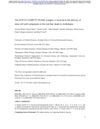 3 citations,
March 2014 in “Annals of Hepatology”
3 citations,
March 2014 in “Annals of Hepatology” A man lost all his hair after stopping hepatitis C treatment and it didn't grow back.
 August 2009 in “Journal of Oral and Maxillofacial Surgery”
August 2009 in “Journal of Oral and Maxillofacial Surgery” The document concludes that understanding hair loss patterns and careful surgical techniques are key for successful hair transplantation in oral and maxillofacial surgery.
53 citations,
August 2015 in “The Italian Journal of Pediatrics/Italian journal of pediatrics” Excessive body hair can signal complex health issues.
January 2025 in “Pharmaceuticals” Peptide-based hydrogels are promising for healing chronic wounds effectively.
16 citations,
April 2021 in “Frontiers in Cell and Developmental Biology” New hair follicles could be created to treat hair loss.
 65 citations,
April 2020 in “International Journal of Molecular Sciences”
65 citations,
April 2020 in “International Journal of Molecular Sciences” PRP injections may be a safe, effective alternative for hair loss treatment compared to minoxidil and finasteride.
June 2024 in “Regenerative Therapy” iPSCs show promise for hair regeneration but need more research to improve reliability and effectiveness.

A mix of Polygonatum sibiricum and Nelumbinis semen may ease menopause symptoms with fewer side effects.
 140 citations,
February 2020 in “Frontiers in Plant Science”
140 citations,
February 2020 in “Frontiers in Plant Science” RNAi-based biopesticides could be safe and effective for pest control with careful development and risk assessment.
2 citations,
January 2020 in “Evidence-based Complementary and Alternative Medicine” Hataedock treatment improved skin health and reduced atopic dermatitis symptoms by enhancing the skin barrier and reducing inflammation.
 3 citations,
February 2021 in “Evidence-based Complementary and Alternative Medicine”
3 citations,
February 2021 in “Evidence-based Complementary and Alternative Medicine” The Chinese herbal supplement BeauTop can potentially boost hair growth and thickness by increasing a protein called Vascular Endothelial Growth Factor.
 39 citations,
June 2017 in “Journal of Applied Research on Medicinal and Aromatic Plants”
39 citations,
June 2017 in “Journal of Applied Research on Medicinal and Aromatic Plants” Plant-based ingredients are effective and safe for modern skincare products.
 13 citations,
December 2017 in “BMC Complementary and Alternative Medicine”
13 citations,
December 2017 in “BMC Complementary and Alternative Medicine” The Asian herbal mix with Houttuynia cordata, Perilla frutescens, and green tea helped grow hair in mice.
 19 citations,
September 2015 in “Therapeutic Delivery”
19 citations,
September 2015 in “Therapeutic Delivery” Active transdermal technologies in cosmetics help deliver skin treatments effectively, but their safety and effectiveness depend on skin type and treatment choice.
79 citations,
December 1990 in “Clinical endocrinology” The testes control steroid production through complex interactions involving various cells and signaling molecules.
 115 citations,
September 2012 in “Experimental Dermatology”
115 citations,
September 2012 in “Experimental Dermatology” Androgens have complex effects on hair growth, promoting it in some areas but causing hair loss in others, and our understanding of this is still evolving.
 1 citations,
January 2023 in “IEEE access”
1 citations,
January 2023 in “IEEE access” Deep learning helps detect skin conditions and is advancing dermatology diagnosis and treatment.
 September 2023 in “IP Journal of Nutrition, Metabolism and Health Science/IP Journal of Nutrition Metabolism and Health Science”
September 2023 in “IP Journal of Nutrition, Metabolism and Health Science/IP Journal of Nutrition Metabolism and Health Science” Recognizing and managing hirsutism, alopecia, and acne is crucial for improving wellbeing in women with PCOS.
 9 citations,
July 2001 in “Cell”
9 citations,
July 2001 in “Cell” Cells from certain embryo parts can induce head formation in another embryo, involving complex signaling pathways.
 10 citations,
April 2023 in “Acta biomaterialia”
10 citations,
April 2023 in “Acta biomaterialia” New hydrogel dressing with antibiotic speeds up burn healing and skin regeneration.
 188 citations,
May 2009 in “Plant physiology”
188 citations,
May 2009 in “Plant physiology” Researchers found 19 genes important for root hair growth in a plant called Arabidopsis.
 17 citations,
May 2011 in “Gene Therapy”
17 citations,
May 2011 in “Gene Therapy” Using polyethylenimine-DNA to deliver the hTERT gene can stimulate hair growth and may be useful in treating hair loss, but there could be potential cancer risks.
 19 citations,
October 1994 in “Tumori Journal”
19 citations,
October 1994 in “Tumori Journal” As of 1994, treatments for liver cancer had not significantly improved patient survival.
 20 citations,
January 2021 in “Plants”
20 citations,
January 2021 in “Plants” High energy boosts root hair growth in plants, while low energy stops it.
 989 citations,
August 2007 in “The Lancet”
989 citations,
August 2007 in “The Lancet” PCOS is a complex condition with major health impacts, needing more research for better diagnosis and treatment.
 1 citations,
April 2023 in “Biomaterials advances”
1 citations,
April 2023 in “Biomaterials advances” Gellan gum hydrogels help recreate the environment needed for hair growth cell function.
 2 citations,
December 2020 in “bioRxiv (Cold Spring Harbor Laboratory)”
2 citations,
December 2020 in “bioRxiv (Cold Spring Harbor Laboratory)” The SYP123-VAMP727 complex is important for transporting materials that harden the root hair shank in Arabidopsis.
 November 2022 in “bioRxiv (Cold Spring Harbor Laboratory)”
November 2022 in “bioRxiv (Cold Spring Harbor Laboratory)” MOF controls skin development by regulating genes for mitochondria and cilia.
 11 citations,
February 2019 in “Frontiers in Physiology”
11 citations,
February 2019 in “Frontiers in Physiology” Hair properties are interconnected; a comprehensive, cross-disciplinary approach is essential for understanding hair behavior.
 13 citations,
December 2019 in “Nutrients”
13 citations,
December 2019 in “Nutrients” An apple-based supplement was found to stimulate hair protein production, which may help with hair growth.
























